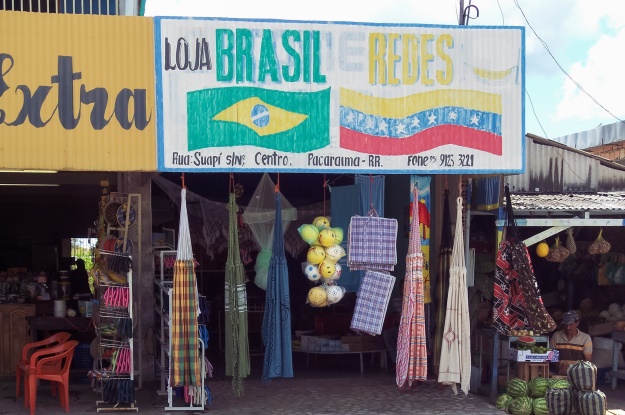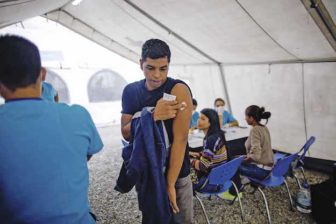Venezuela’s protracted political and economic crisis is reaching a breaking point. Over the past few months thousands of Venezuelans fled across the border to seek sanctuary in northern Brazil, many of them taking only what they could carry on their backs. Although the humanitarian emergency has been brewing for some time, the Brazilian authorities appear woefully under-prepared to deal with the influx.
According to one recent arrival, Merlina Ferreira, “In Venezuela, I was a psychologist and my husband a lawyer. Here in Brazil, he unloads trucks and I look after our small children since daycare is too costly.” Merlina joins at least 5,000 compatriots who recently applied for asylum in Boa Vista, a city in the state of Roraima. According to the Federal Police the numbers sky-rocketed in the first few months of 2017, as compared to 2,230 applications in 2016, 234 in 2015, and just 9 in 2014.
The spike in population displacement reflects a dramatically deteriorating situation in Venezuela. Reports are emerging of spiraling criminal violence, prolonged food shortages and sustained unemployment. It is still an open question whether these factors are legitimate grounds for refugee protection under international law. That hardly matters to people like Ferreira who feel that their last resort to avoid starvation and homelessness is to cross an international border. Refugee specialist Alexander Betts describes this phenomenon as “survival migration,” and for good reason.
The conditions in Brazil, however, are marginally better than those from where Venezuelans like Ferreira originally fled. In Pacaraima, a Brazilian village bordering Venezuela, undocumented indigenous people and other migrants are camping out on the streets, selling handicrafts and begging for food. They are living in filthy and mosquito-infested settings, with kids playing amid the trash. At dusk, migrants take on sex work near the town’s local bus station. The settlement´s facilities are in precarious shapes and the municipality’s public hospitals and schools are overwhelmed by the new arrivals.
Brazil’s primary response to the emergency has been to draft more laws. After some hesitation, the country’s National Immigration Council approved a resolution in March this year allowing migrants from all bordering countries to apply for a two-year temporary resident status. The Brazilian authorities are looking to provide migrants with an opportunity to stay in Brazil, but also to steer Venezuelans away from an over-burdened and understaffed national asylum system. Indeed, Brazil is already struggling to manage its modest caseload of just 8,863 refugees around the world.
While the efforts of the National Immigration Council are commendable, they are also ineffective in practice. For one, the application for temporary residency is intensely bureaucratic and requires paying fees and submitting documents that are out of reach to most new arrivals from Venezuela. Most migrants have little access to accurate information on the pros and cons of applying for residency or asylum. And given the deep seated fragility of Brazil’s over-stretched asylum system, individual claims can take more than two years to be processed, leaving Venezuelans stranded in limbo.
The National Immigration Council’s resolution also lacks teeth. Specifically, it was not accompanied with resourced measures to protect and care for new migrants – whether decent shelter, access to health, the provision of food, or other basic requirements of the migrant population. And since there is no clear national directive to provide for emergency needs, federal, state and municipal authorities are squabbling over which entity is responsible for addressing the situation.
What makes this recent crisis especially frustrating is that it is not the first time it’s happened. After more than 85,000 Haitian migrants fled to Brazil after the 2010 earthquake, the Brazilian government’s primary response was to issue laws. In particular, Brazil provided humanitarian visas from its Embassy in Port-au-Prince to dissuade the spontaneous flight of new migrants to Brazil. While understandable, it was a decidedly weak response given Brazil’s considerable investment in Haiti since taking the lead of the UN peacekeeping mission there in 2004.
The Brazilian government adopted a similar posture with respect to Syrian refugees. After announcing a “welcoming policy” for as many as 100,000 Syrians in 2016, the new incoming government quietly backed away from the pledge. Instead, Brazil created a special visa permitting people affected by the conflict to travel legally and apply for asylum on arrival. The visa was issued to over 8,000 people but only about 2,200 Syrian refugees actually travelled to the country in search of protection. The numbers dropped off dramatically since there was no financial or material assistance for travel and local integration support on arrival.
Brazil needs to do more than draft laws when it comes to migrants and refugees. What is required is a comprehensive approach to asylum that simultaneously provides for the essential social and economic requirements of new arrivals. Providing access to Brazilian territory and proper documentation is a necessary, but insufficient step toward protecting and eventually integrating migrants and refugees. A coordinated effort joining federal, state and city entities together with civil society organizations is necessary.
There are several ways a comprehensive approach can be advanced. At the outset, new norms on protection and integration – including those issued by the National Council on Immigration – must be accompanied by a review of the scope, scale and volume of cross-border movements as well as the capacities of local host populations. Moreover, Brazil must create a genuinely unified protection and assistance system that centralizes procedures for all phases of the asylum process. At the moment, mandates and resources are scattered across multiple organs and there are few incentives to cooperate.
For the new norms and unified system to be effective, Brazil also needs to establish an advance presence in strategic parts of the country. This will require setting up small cells in key urban centers and border towns to anticipate, respond to, and support new arrivals. Finally, Brazil needs to dramatically scale up its refugee resettlement program and attract support from civil society and the private sector. The government is clearly unable to cope on its own. Bold commitments matched by appropriate resources can ensure that Brazil maintains its status as a welcoming country, one that provides genuine protection to people seeking safer ground.
—
Bonna Nogueira is a former General-Coordinator for Refugee Issues at Brazil’s Ministry of Justice and a consultant with the Igarapé Institute.
Folly is a researcher with the Igarapé Institute.








